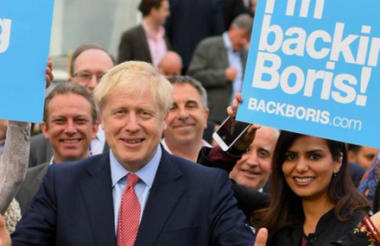Charity sector leaders have responded to the election result, which saw the Conservatives return to power with a big majority, by reminding the next government to fix social inequalities and calling for greater freedom to campaign.
The third general election in five years has returned the largest Conservative majority to Parliament since 1987, and leaders from the sector's representative bodies urged Boris Johnson to listen to the sector.
ACEVO: ‘The role of civil society has never been more important’
Vicky Browning, chief executive of ACEVO, said: “During the general election campaign, civil society leaders called for whoever formed the next government to take urgent action to tackle the stark inequalities and injustices in our society, from ending homelessness to fixing the social care crisis. While the election result creates big changes in parliament, it does not change what civil society exists to do or what we will be trying to achieve.
“Arguably the role of civil society has never been more important. There is a role for civil society leaders in creating unified and healthy communities, in amplifying the voices of those most often ignored by government, and in holding the government’s feet to the fire on addressing the social, environmental and community issues which have been neglected for too long.
“ACEVO will support its members to make the biggest possible difference, and we will continue to advocate for an enabling environment for civil society, greater freedom to campaign and more ambitious, values-based leadership from MPs.”
Small Charities Coalition: ‘Silencing and ignoring us is simply not an option’
Rita Chadha, chief executive of the Small Charities Coalition, said: “In one night, everything and nothing has changed for small charities. The need for the work and contribution of small charities in every constituency and corner of the UK remains unabated, the challenges we faced yesterday will continue today. What we need is for government to recognise, respect and reward small charities, in the same was as they work with other sectors. We can no longer be the outsiders, denied a voice and refused access to the corridors of influence, power and decision making.
“In Baroness Barran, we have an amazing ally who understands charities and their worth. What we now need is a regulator who understands charities, that is independent of politics, and that is focused on our collective survival and not their own.
“Any government that fails to understand the power of small charities, in particular, to help heal the divides that have arisen in the run up to Brexit, will be doing itself a disservice. Small charities are more than free or cheap labour, they are the eyes and ears of our society, conscious of our communities, and the beating heart of our nation. Silencing and ignoring us is simply not an option.
“The Small Charities Coalition will be shortly launching a campaign for all MPs to meet with small charities in their constituency. This is an opportunity to understand how small charities operate, hear our concerns and forge relationships that benefit us all. The #SmallCharitiesMovement will be on the march in January we hope MPs, from all political parties, will join us.”
Institute of Fundraising: 'The new government faces huge challenges'
Peter Lewis, chief executive of the IoF, said: “The new government faces huge challenges. To truly deliver on the One Nation vision the Prime Minister has set out, we urge the government to work in partnership with charities around the UK to tackle the crucial issues we face locally, nationally and globally, helping to unlock even greater generosity from the British public.
“In the first year of the new government we hope to have fundraising recognised as a chartered profession, and want to work with MPs from all parties to champion excellent fundraising, and its fundamental role in creating a better world”.
Directory of Social Change (DSC): 'Be kind and respectful to those who don’t share your views'
DSC chief executive Debra Allcock Tyler said: “Whether you’re rejoicing or in despair this morning at the result, remember that positive social change isn’t dependent on governments. Charities, social movements and individuals can overcome pretty much anything they face.
“However you voted, be kind and respectful to those who don’t share your views”.
NCVO: 'There’s a list of pressing tasks for the next government'
Elizabeth Chamberlain, acting policy director at NCVO, said: “There’s a list of pressing tasks for the next government which we look forward to working with them on. The most important is establishing a clear and credible way forward on Brexit that upholds existing rights and standards and which provides certainty for charities and ensures they can continue to recruit the skilled staff they need. It's equally crucial that the expertise of charities is taken on board in the Brexit process.
“Also urgent is bolstering local government funding to reduce the strain that is being felt by charities and the people and places they support. Community cohesion and wellbeing could also be strengthened by using dormant assets to create a community wealth fund to help communities take control of the local resources that matter to them, such as pubs or community centres.”
Charity Finance Group (CFG): 'We need clarity about the type of country we want to be post Brexit'
Caron Bradshaw, chief executive of CFG, said: “The election result delivered a fundamental shift in politics. It’s essential that the charity and voluntary sector step up to be the safety net, the champions of the vulnerable and to speak up for all areas of society.
“We now urgently need to see the detail of the UKSPF [UK Shared Prosperity Fund] arrangements and to take rapid and significant steps to avoid a no-deal Brexit in December 2020. We need clarity about the type of country we want to be post Brexit so that we can support our civil society within it.
“CFG will be at the forefront of making the case to the new government for a long-term, strategic approach to funding our sector that will enable civil society and the communities we serve to thrive, as outlined in our Charity Finance Manifesto. Our purpose is redoubled and our case for funding strengthened.
“Together with our members, CFG will work to see our mission for a financially confident, dynamic and trustworthy sector lead the way in securing our future and supporting our communities.”
NPC: Government must deliver its social promises
Dan Corry, CEO of the charity sector think tank NPC, said: “Charities and the wider social sector will be critical to delivering, and plugging the gaps, in the government’s ambitions to tackle this country’s most pressing social challenges, from cutting homelessness to improving health.
“But the government must not continue to use Brexit as an excuse for delay and inaction. Its priority now is to get on with delivering its social promises, and to work with charities and funders who will have a critical impact on the health and wellbeing of the UK over the next five years.”
Association of Charitable Foundations: 'Civil society helps bring communities together'
Carol Mack, chief executive of the ACF, said: “The result was clear and gives the prime minister and his government the opportunity to move ahead with their commitments. I hope that as they do so, they will be mindful of the need to heal divisions and particularly support disadvantaged areas and vulnerable people. Civil society helps bring communities together and enables people to thrive.
“The contribution that civil society, including charitable foundations, makes to our country is huge. It is vital that its full potential is realised, and I look forward to discussing how we can work most effectively with the new government to ensure this happens.”
Bond: 'The world is facing some of the biggest global challenges of our time'
Stephanie Draper, CEO, Bond a UK network for international development charities, said: “We look forward to the Prime Minister using his majority to deliver on the Conservative Party’s manifesto commitments to help the poorest communities in the world out of poverty, get more girls into quality education and demonstrate global leadership as the UK hosts next year’s UN Climate Change Summit.
“The world is facing some of the biggest global challenges of our time - poverty, inequality, climate change and conflict. The UK has an opportunity to continue to be a major force for good in the world by promoting good jobs, universal health coverage, more children in education, protecting the rights of women and girls and tackling the climate crisis.
“Delivering these commitments means ensuring that aid abides by the rules and first and foremost goes to the people who need it the most. The best way to achieve this is by retaining a standalone Department for International Development, with a Secretary of State for International Development, that have the expertise, reputation and credibility to get the job done.”
Social Enterprise UK: 'Opportunity for a fresh direction'
Peter Holbrook, chief executive of Social Enterprise UK said: “This result is an opportunity to take the country in a fresh direction following an election campaign in which voters were crying out for change. The Prime Minister has said that he wants to unleash Britain’s potential, to do that he needs to ditch business as usual.”
“Social enterprises are optimistic for the future. We believe that by backing the right kinds of businesses we can transform our country, our communities and tackle the triple threat facing our planet of a climate emergency, social division and economic stagnation. He has said he wants to lead a People’s Government. It is time to back the People’s Business.”
“The prime minister faces a choice. He backs our current broken economic model which has taken us to the brink. He now has the chance to choose serious economic reform, reset the system and put us on a path towards environmental sustainability and social justice. We don’t have time to waste.”
MS Society: 'How we support disabled people is a barometer for society'
Georgina Carr, head of campaigns and external relations at the MS Society, said: “When Boris Johnson first entered Number 10 back in July, he claimed he would fix the social care system once and for all. We have seen little progress, but he and the new UK government now have an opportunity to change that. More than 100,000 people live with MS in the UK and, in just the last month, over 20,000 called on the new PM to change the humiliating process of claiming PIP.
“How we support disabled people is a barometer for society, and the lack of support available through disability benefits and social care has left thousands locked out of work and unable to leave their homes. We hope to work closely with the Conservative party to tackle these failures, because people with MS can’t wait any longer.”
Independent Age: 'For far too long we’ve seen the care people need compromised'
Deborah Alsina MBE, chief executive of Independent Age, said: “Following yesterday’s general election, we are urging the newly elected government to prioritise the wellbeing of older people.
“For far too long we’ve seen the care people need compromised by delays to fixing the systems they rely upon. We call on the government to urgently implement personal care free at the point of use, to ensure that all older people have their everyday, essential care needs met. Reforming social care in this way would help to fulfil the prime minister’s promise to make sure that no one should have to sell their home to pay for care.
“The government must also prioritise action on Pension Credit to change the dire situation where two in five households eligible for this support do not receive it, meaning £3.5bn goes unclaimed every year. Pension Credit can make an invaluable difference to the lives of our poorest pensioners – many of whom are having to make choices between heating and eating.
“We look forward to working with newly elected and returning members of parliament across the political spectrum to ensure that everyone in the UK can grow older with dignity, be connected to their communities, and live with good physical and mental health in later life.”
|












